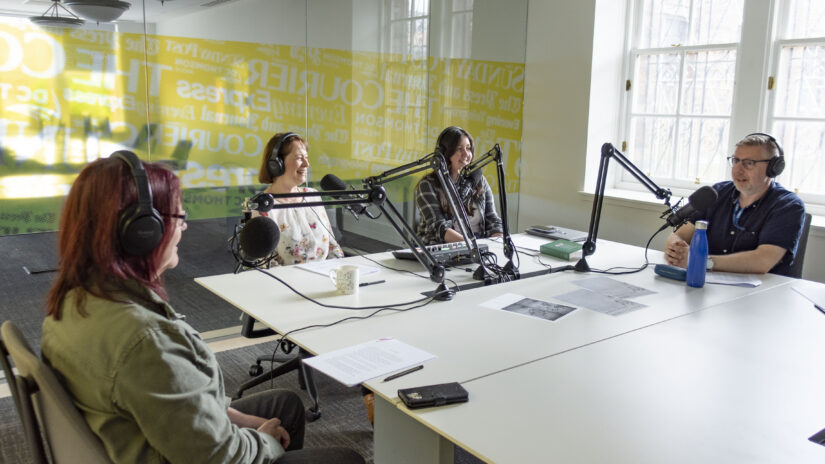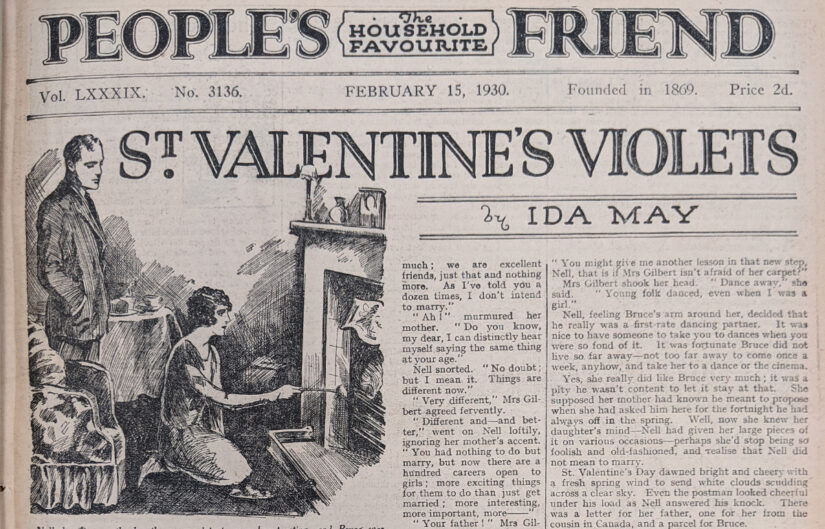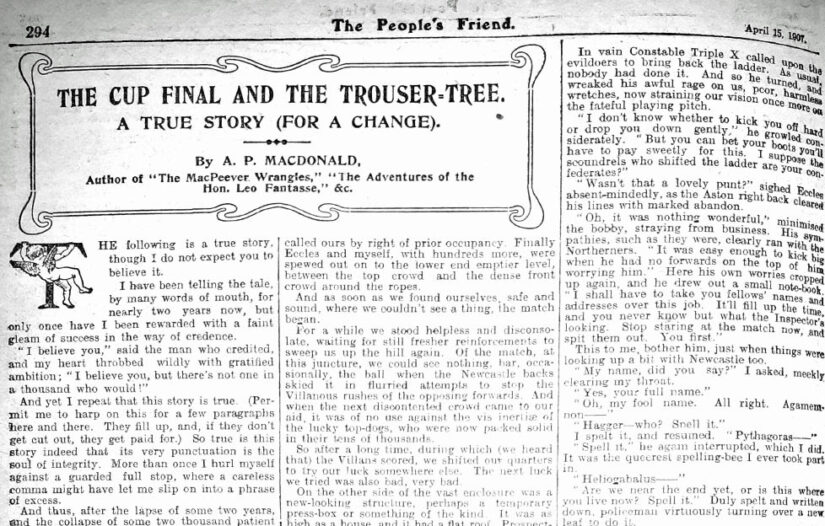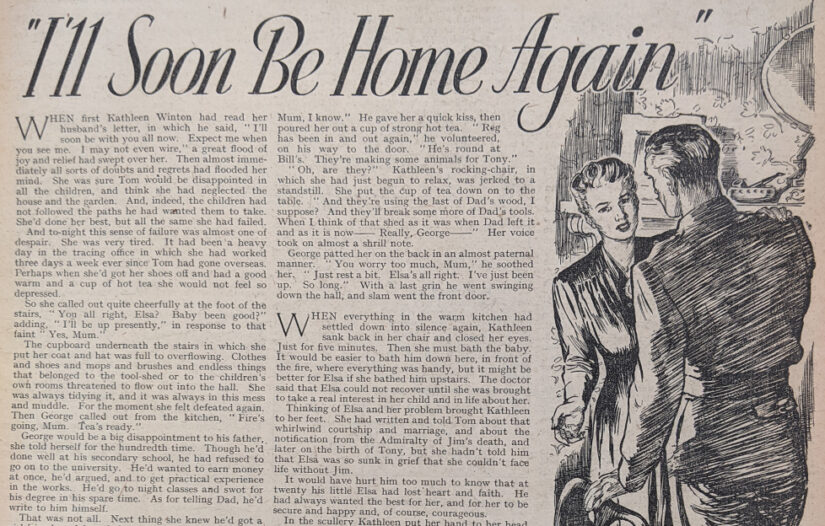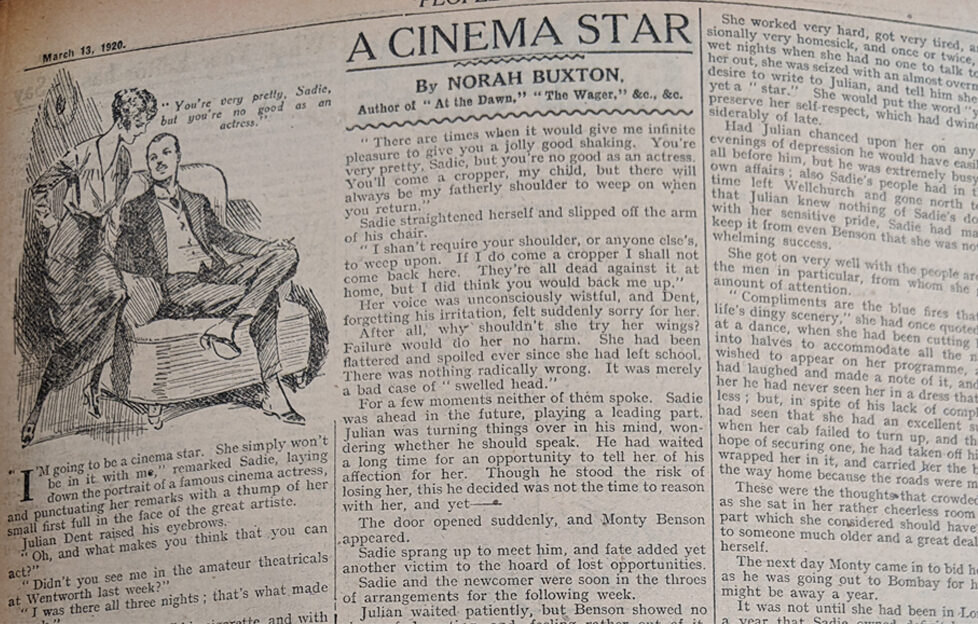
This episode of the Reading Between The Lines podcast is “A Cinema Star” by Norah Buxton, first published in March 13, 1920. Listen along to the episode as you read and let us know what you think!
“I’m going to be a cinema star. She simply won’t be in it with me,” remarked Sadie, laying down the portrait of a famous cinema actress, and punctuating her remarks with a thump of her small first full in the face of the great artiste.
Julian Dent raised his eyebrows.
“Oh, and what makes you think you can act?”
“Didn’t you see me in the amateur theatricals at Wentworth last week?”
“I was there all three nights; that’s what made me ask.”
Dent knocked the ash off his cigarette, and with a glint of amusement in his eyes watched the warm pink steal up into Sadie’s small oval face.
“You’re such a deadly stuffy crowd here. You would never do anything, except go backwards and forward to a dull office, occasionally playing a game of bridge in the evening. Anyway I’ve had enough of it. Dick Henniker says I should make my fortune on the stage, and Monty Benson says he will take me up to town next week, and give me an introduction to the manager of one of the big Film companies. You’re the only person who thinks I can’t do anything, except keep myself neat and tidy, dust my bedroom, and do a little shopping. Oh, Julian Dent, you make me tired.”
She smoothed out the crumpled cinema star, and looked intently into the pretty, almost speaking face. Then she crossed over to the mirror above the fireplace.
“I’m every bit as good-looking as that young woman there, and I’ve even got better eyes than she has.”
She turned her great brown eyes upon Dent, brimming over with mischief.
Dent was very susceptible where Sadie was concerned. He had been more or less in love with her for several years now, and Sadie, though she teased his life out and was on occasions decidedly insulting, had a very warm spot in her heart for him.
“You don’t approve of my going? You’d like me to stick here all my life when I might be making a great name and hundreds a week.”
She looked across at the tall figure lying back in the easy chair, surrounded by a haze of blue smoke; at the strong, blunt features and close-clipped moustache; at the mocking hazel eyes, and decided that she should miss him dreadfully.
“Couldn’t you chuck that dingy old office and come too? You might get a minor part, and it would be nice to have you near.”
Dent threw back his head and laughed.
“Well, of all the impertinence! I suppose you think I should be useful to wait upon you—to fetch and carry for the ‘star’. I fear that idea is out of the question. You see the reason of my being discharged from military service was because since my father died I’m the only one left to carry on the concern. I’m afraid a family of five couldn’t exist upon the possible salary of a probable minor.”
Sadie laid her hand suddenly upon his shoulder.
“Oh, you poor old dear, I’d forgotten. I’m a beast. Forgive me.”
Dent drew her down upon the arm of his chair and looked into the impish face.
“There are times when it would give me infinite pleasure to give you a jolly good shaking. You’re very pretty, Sadie, but you’re no good as an actress. You’ll come a cropper, my child, but there will always be my fatherly shoulder to weep on when you return.”
Sadie straightened herself and slipped off the arm of his chair.
“I shan’t require your shoulder, or anyone else’s, to weep upon. If I do come a cropper I shall not come back here. They’re all dead against it at home, but I did think you would back me up.”
Her voice was unconsciously wistful, and Dent, forgetting his irritation, felt suddenly sorry for her.
After all, why shouldn’t she try her wings? Failure would do her no harm. She had been flattered and spoiled ever since she had left school. There was nothing radically wrong. It was merely a bad case of “swelled head”.
For a few moments neither of them spoke. Sadie was ahead in the future, playing a leading part. Julian was turning things over in his mind, wondering whether he should speak. He had waited a long time for an opportunity to tell her of his affection for her. Though he stood the risk of losing her, this he decided was not the time to reason with her, and yet—
The door opened suddenly, and Monty Benson appeared.
Sadie sprang up to meet him, and fate added yet another victim to the hoard of lost opportunities.
Julian waited patiently, but Benson showed no signs of departing, and, feeling rather out of it, he rose to go.
“I’ll see you out,” exclaimed Sadie, following Julian from the room.
In the dim light of the hall they stood for a moment.
He did not notice that Sadie was trembling slightly, and the light was not sufficient for him to see the sudden pain in her eyes.
She held out her hand.
“Well, good-bye, Julian. I’m sorry you’ll be away next week. I shan’t see you again, but I suppose you’ll still be here when I come back.”
The slight accent on the word “still” somehow nettled him.
“Oh yes, I shall be here. Good-bye and good luck, old girl.”
His hand was upon the latch of the door; she glanced up searchingly into his face, looking for something that was not there. Just the friendly, inconsequent smile, that was all.
A chill gust of wind blew in, and with a little gesture of finality Julian shut the door quickly, and was gone.
For a moment the future “star” stood where he had left her. The piano sounded from upstairs. It was Monty amusing himself with snatches from the latest revue. He played brilliantly, the lively, inconsistent music calling to Sadie as she stood there fighting back the tears that would come. As ever, she had relented five minutes too late. The music turned to a dreamy waltz.
Sadie climbed the stairs slowly; though she smiled bravely, her lips were quivering. Julian had not even asked her to write.
Sadie’s first week in town passed like a flash. It seemed to consist of a series of introductions and interviews by day, and theatres and restaurants by night.
True to his word, Monty did all he could for her.
The freedom and variety of her life after the somewhat cramped existence of Wellchurch was what appealed most strongly to her.
She was surprised and a little hurt than none of the managers of the various film companies had made immediate demands for her services. Most of them inquired whether she had had any previous experience of the stage, and one or two had smiled rather broadly when she had informed them that she acted each year in the local dramatic society.
However, they were all quite kind to her, though she was bound to own to herself that they were not exactly encouraging.
She worked very hard, got very tired, and occasionally very homesick, and once or twice, on cold, wet nights when she had no one to talk to or take her out, she was seized with an almost overmastering desire to write to Julian, and tell him she was not yet a “star.” She would put the word “yet” in to preserve her self-respect, which had dwindled considerably of late.
Had Julian chanced upon her on any of these evenings of depression he would have easily carried all before him, but he was extremely busy with his own affairs; also Sadie’s people had in the meantime left Wellchurch and gone north to live, so that Julian knew nothing of Sadie’s doings, for, with her sensitive pride, Sadie had managed to keep it from even Benson that she was not an overwhelming success.
She got on very well with the people around her; the men in particular, from whom she got a fair amount of attention.
“Compliments are the blue fires that light up life’s dingy scenery,” she had once quoted to Julian at a dance, when she had been cutting her dances into halves to accommodate all the names that wished to appear on her programme, and Julian had laughed and made a note of it, and then told her he had never seen her in a dress that suited her less; but, in spite of his lack of compliments, he had seen that she had an excellent supper, and when her cab failed to turn up, and there was no hope of securing one, he had taken off his overcoat, wrapped her in it, and carried her the best part of the way home because the roads were muddy.
These were the thoughts that crowded round her as she sat in her rather cheerless room studying a part which she considered should have been given to someone much older and a great deal uglier than herself.
The next day Monty came in to bid her good-bye, and he was going out to Bombay for his firm, and might be away a year.
It was not until she had been in London almost a year that Sadie owned definitely and honestly that she was a failure.
That, instead of amassing a fortune, she was getting poorer.
It was a very bitter pill to swallow after all her dreams of fame. Her disappointment was very deep, but she knew and owned herself beaten. She decided that now was the time to write and confess her failure to Julian, and straightaway sat down and wrote a long, somewhat dramatic epistle, which she tore up the following morning, and then put on her smartest clothes and went in search of a post in a government office.
She secured the post, but at a small salary, as she was practically without experience of clerical work.
Having arranged to start the following week, she went home for a short holiday.
Her family were singularly concerned at her changed appearance, and begged her to remain at home, but a sense of restlessness was upon her, made greater by her failure, and she duly made her appearance in the office on the date fixed.
She was astonished and puzzled a few weeks later to receive a postcard from Julian Dent, headed New York. He merely hoped she was doing well. He expected to be back in England in about six months, and looked forward to seeing her again. The card, addressed to her old home, had been forwarded to her.
She smiled rather ruefully as she read it over, wondering the while what business could have taken him to New York, but she felt distinctly cheered at the thought of seeing him again.
She threw herself strenuously into her work, the monotony and dryness of which threatened at times to overpower her. Her chief relaxation at this time was an evening spent at the cinema. The pictures seemed to have an extraordinary fascination for her. She seemed to take a morbid pleasure in seeing the various stars she had once meant to eclipse, and it was on a drab November evening some months after, following a day of mistakes and minor annoyance at the office, that she was wending her way home to her rooms when turning into the Strand she walked into Julian Dent.
For a moment she was afraid that he was going to pass her. She knew she had altered, that she was not nearly so smart as formerly, and had lost her old, vivacious, impertinent manner; but he did not pass.
“Why!” he exclaimed, “it’s the cinema star,” and he took her hand in a grip that made her wince.
Summoning all her reserve courage to her aid, she answered him laughingly.
“Not even an embryo star, sir. Merely a clerk, at your service,” and her lower lip quivered.
Then it was that Dent guessed at the keen disappointment underlying her light words.
“Now,” he went on, “where shall we go, and what shall we do? What about tea somewhere and a good talk, and then the pictures?”
Sadie glanced at him quickly.
It was hardly tactful, she thought, to suggest that. Still, perhaps he didn’t think.
She readily acquiesced, and was surprised to find how her weariness slipped from her as they talked. How things reversed themselves since their last meeting!
Dent was doing all the talking now, cheering Sadie up, trying to raise her out of that sort of apathy that failure and uncongenial work had saddled upon her.
During tea Dent drew out bit by bit the story of the last eighteen months.
He seemed disinclined to talk about himself or his business in America.
“Why on Earth didn’t you write to me, Sadie? I would have done all in my power to help you. You shouldn’t have let your pride stand in the way.”
Sadie carefully avoided his eyes.
“I did write once, but I tore it up. It’s not much fun writing people to tell them you’ve failed.”
Julian rose from the table.
“Well, if you’re ready shall we go out? There’s a picture on tonight that I’m rather keen on seeing. You won’t be bored, will you?” Sadie shook her head.
Julian tucked her hand through his arm, and together they made their way through the foggy streets. There was an air of mystery about him that Sadie quickly sensed. There was also some motive in his bringing her there.
Sadie decided that the pictures were very poor. Truth to tell, she was not taking particular notice to them. The man at her side was claiming most of her attention. He looked very bronzed and fit, and there was an air of alertness about him that she had never seemed to notice in the old days.
She was anxious to question him about his trip to America, but there was a slight aloofness to his manner that held her back.
Julian’s voice roused her from her reverie, and she turned her eyes towards the screen.
The big drama had commenced, and Julian watched her covertly with his slow, detached smile.
A man sat at a desk, his head bent. There was something strangely familiar about the head, to Sadie. She narrowed her eyes and cast about in her memory, wondering where she had seen it before. Then suddenly the man raised his head, and the eyes from the screen looked straight into hers. They were Julian Dent’s eyes!
With a sharp exclamation of surprise Sadie turned to her companion.
“Julian, why didn’t you tell me?” she said under her breath.
“Why should I tell you? You never told me about yourself. I preferred to let you imagine I was still going backwards and forwards to the stuffy office. It was my greatest ambition to act for the film, and there was an opportunity awaiting me, only I couldn’t throw up the business and dismiss a lot of employees for the sake of a whim. It is all right now. I found an excellent man, who is managing for me, but I had to wait some months for him.”
Julian broke off suddenly, for Sadie had buried her face in her hands, and was biting her lips to keep the tears back.
The girl sitting next to her had forsaken the drama upon the screen, and was eagerly watching the one being carried on next to her.
It was at that moment that she discovered Julian’s identity, but by the time the news had reached the end of the row the cinema star and his companion had stumbled out of their places, and were once more out in the murky London night.
Julian hailed a taxi, and, putting the astonished Sadie into it, said “Hampstead” to the driver, and banged the door after him.
A sense of adventure was stealing over Sadie, arousing her love of the unusual.
“Why Hampstead?” she asked as she carefully put her hat straight and fanned her hot cheeks.
“Why not?” retorted Julian. “It was the only place I could think of at the moment that was a convenient distance off. While we are asking questions—will you marry me, Sadie?”
In the flickering light Sadie peered into his eyes. Her own were bright with tears.
“You really mean that you want me—me, a miserable, crawling failure?”
“As a failure you’re perfect. As a star, I should never have dared to approach you. Tell me, have you still a craving to be famous?”
“Only as your wife,” she replied as the taxi pulled up with a jerk.
A burst of the old, spontaneous laughter broke from Sadie’s lips.
“And now that we are at Hampstead, what do you propose that we should do?”
She looked up into Julian’s face. The old whimsical smile that she loved played around his lips.
“I propose,” Julian replied, “to go straight back to town, and catch the midnight express north, and tell your people that you have decided not to be a star after all.”
Read and listen to our previous Reading Between The Lines stories.

